What Are The Best Service Dog Breeds For Seniors?

If you’re a senior citizen, finding the right service dog starts with understanding your daily struggles. Do you worry about falling? Need help hearing important sounds? Feel anxious living alone?
You’re not losing your independence, but you may face new challenges. Millions of seniors deal with the same concerns. The good news is that a service dog can help you stay in your own home safely for years longer.
But not just any dog will do. Your 75-year-old body has different needs than a 30-year-old’s. You can’t chase a hyperactive puppy around the block. You need a calm partner who understands that some days your arthritis flares up. You need a dog that moves at your pace but stays alert for problems.
Your living situation matters too. If you’re in a small apartment, a massive dog will knock things over. If you use a walker, you need a dog that won’t tangle in the wheels. Be honest about your energy level as well. Can you handle daily walks? Do you get tired easily?
You also need to think ahead because our needs will change. Arthritis might get worse. Your hearing could decline. The smart move is getting a dog trained for what you’ll need in five years, not just today. That way, your dog grows into helping you, rather than becoming outdated.
Here are 8 of the best service dog breeds for different senior needs:
- Best for Balance Problems
- Best for Medical Emergencies
- Best for Hearing Loss
- Best for Anxiety and Fear
- Best for Seniors with Allergies
- Best for Memory Support
- Best for Serious Physical Needs
- Best for Apartment Living
1. Best Service Dog for Balance Problems: Golden Retriever
Golden Retrievers have the perfect temperament for balance work. They’re strong enough to support you but gentle enough not to knock you over. They learn to match your walking speed exactly and don’t pull ahead when you need to rest.
These dogs can wear special harnesses that spread your weight evenly across their back. They can help you stand up from chairs or catch you if you start to fall. Their soft mouths allow them to carry your medications without crushing the pills.
Be aware, though, that they do shed a lot. Golden fur gets on everything. If you’re already struggling with housework, think about whether you can handle vacuuming more often. Most seniors say the help is worth the extra cleaning, but be honest about your energy for maintenance.
Check out our complete guide on the best breeds for mobility work to learn more.
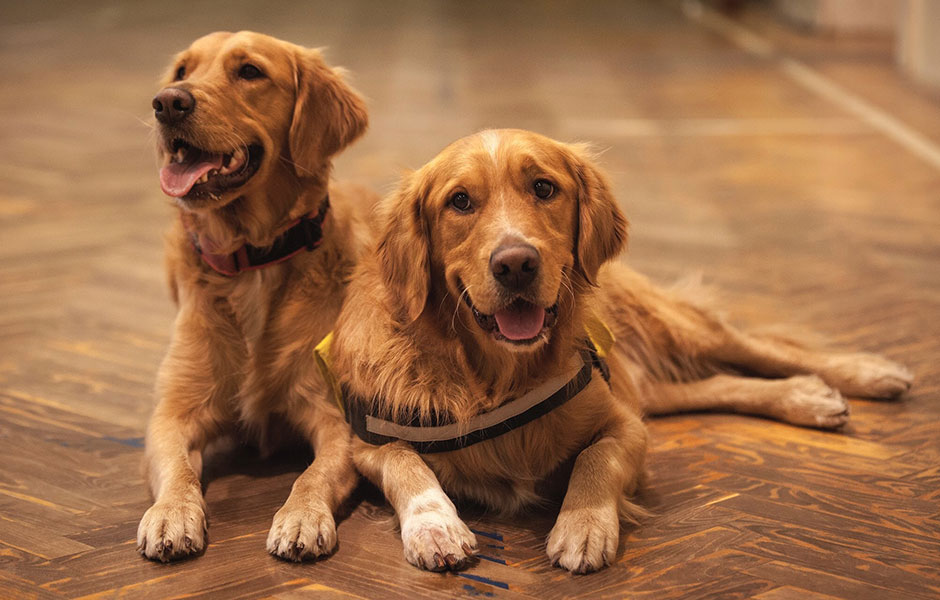
2. Best Service Dog for Medical Emergencies: Labrador Retriever
Labs have incredible noses and can detect seizures, heart problems, and changes in blood sugar levels minutes before they occur. A trained Lab brings medication, pushes emergency buttons, or runs to get neighbors.
These dogs love having important jobs. They stay motivated to work well into their senior years. Some even learn to operate special phones that dial 911 automatically.
But Labs need daily exercise – even when they’re working dogs. If your arthritis makes walking painful or you get winded easily, this breed might exhaust you. A restless Lab stops focusing on medical alerts and starts looking for trouble instead. Only choose this breed if you can still manage 30-minute walks or have family members who can help with exercise needs.
3. Best Service Dog for Hearing Loss: Mixed Breed Rescue
Many excellent hearing dogs come from rescue groups. They learn to touch you gently when important sounds happen, and then they can walk you right to whatever made the noise.
These dogs alert to smoke alarms, doorbells, phones, and people coming up behind you. The smaller mixed breeds often work best. They’re less likely to accidentally knock you over when they’re trying to get your attention.
For seniors on fixed incomes, rescue hearing dogs make financial sense. But you’ll need to invest time in service dog training. If your patience is limited or you’ve never trained a dog before, paying more for a pre-trained dog might be worth it. Think honestly about whether you can handle an older rescue dog that requires extra care and attention.
4. Best Service Dog for Anxiety and Fear: German Shepherd
Living alone gets scary sometimes. German Shepherds naturally protect their families. They can tell the difference between a delivery person and someone who shouldn’t be there. For seniors dealing with anxiety about safety, this brings huge peace of mind.
These dogs also provide psychiatric support during panic attacks. They can be trained to create physical barriers between you and crowds. They can find exits when you feel overwhelmed. Some learn to turn on lights during nightmares or bring anxiety medication.
But German Shepherds need strong leadership. If you’ve never trained a large dog before or if your grip strength has weakened, this might not be your first choice. They also need space to move around, so a cramped apartment will make them restless. If your arthritis makes it hard to maintain control during walks, consider a smaller, calmer breed instead.
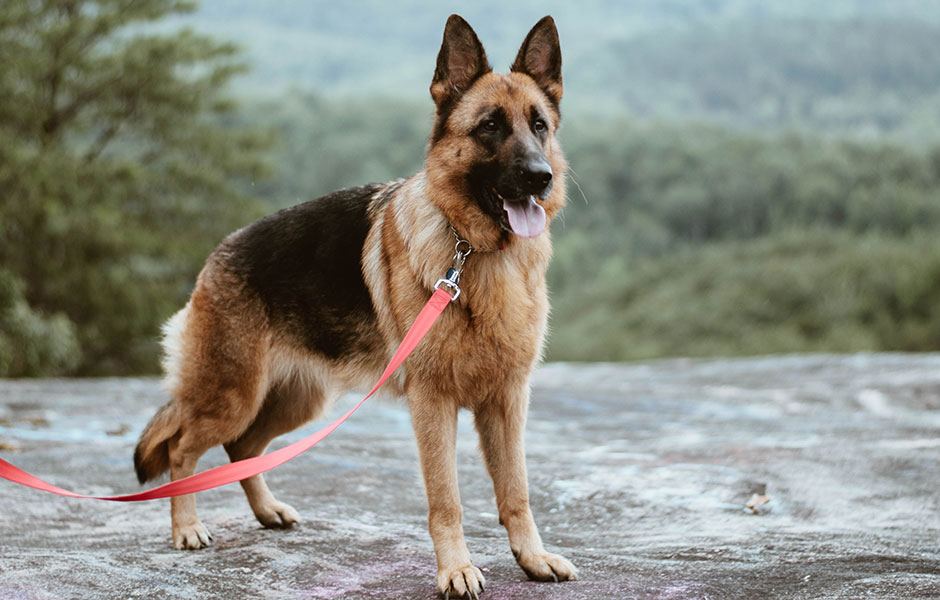
5. Best Service Dog for Seniors with Allergies: Standard Poodle
Standard Poodles don’t shed much, which helps some seniors with breathing problems. Their curly coats trap allergens instead of spreading them around your home.
These dogs are incredibly smart. They can learn to operate light switches, retrieve specific items from different rooms, or even sort medications. Some learn complex routines like bringing different pills at the right times each day.
The grooming requirements are significant, though. Poodles need professional grooming every 6-8 weeks. That can cost $75–$100 per visit. If you’re on a tight budget or can’t drive to appointments regularly, this breed becomes expensive fast. However, for seniors with severe allergies or COPD, this might be the only breed that works without making breathing worse.
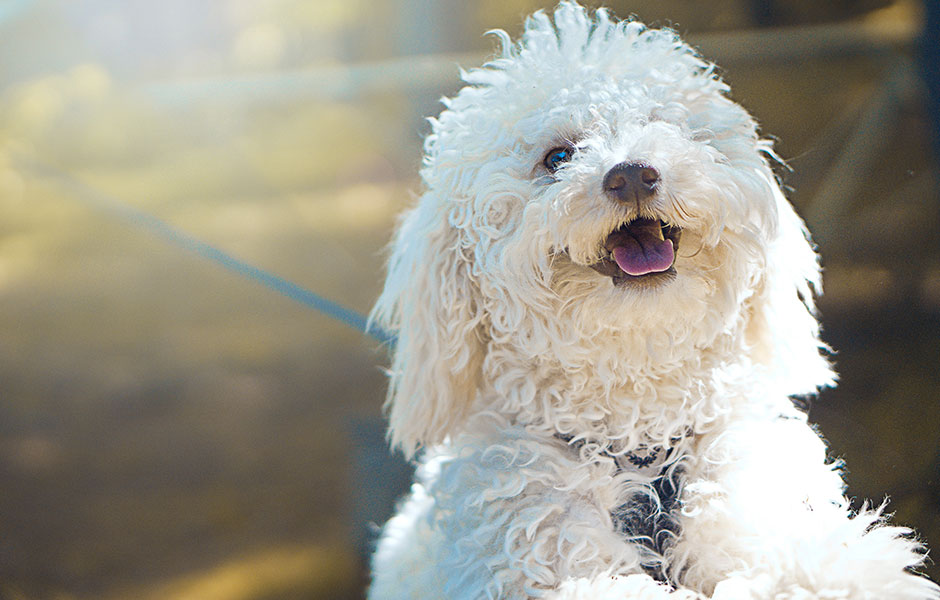
6. Best Service Dog for Memory Support: Border Collie
Border Collies can become living reminders for seniors dealing with memory issues. They learn daily routines and gently guide you through them.
These dogs can remind you to take medications, turn off stove burners, or lock doors at bedtime. They bring you items you’re looking for or guide you to where you left them.
But Border Collies need constant mental stimulation. If you forget to give them puzzle toys or training sessions, they’ll find their own entertainment – usually by chewing your furniture. They’re too smart for their own good sometimes. Only choose this breed if you still enjoy teaching new tricks and can handle a dog that regularly outsmarts you.

7. Best Service Dog for Serious Physical Needs: Bernese Mountain Dog
Bernese Mountain Dogs provide the most physical support of any breed. They’re calm, patient, and strong enough to help seniors with significant mobility challenges.
These gentle giants can help with wheelchair transfers, support someone who’s fallen, or provide stability for seniors using walkers. They’re also patient with medical equipment and won’t get startled by oxygen tanks or mobility devices.
Their temperament matches many seniors perfectly – they’re content to move slowly and rest often. They seem to sense when you’re having a difficult day and adjust their energy accordingly.
The shorter lifespan, though, is heartbreaking. Most Bernese live only 6-8 years. If you’re 80 years old, you might outlive two of these dogs. That’s emotionally and financially difficult, but for seniors who need serious physical help and can handle the eventual loss, the working years these dogs provide can be life-changing.
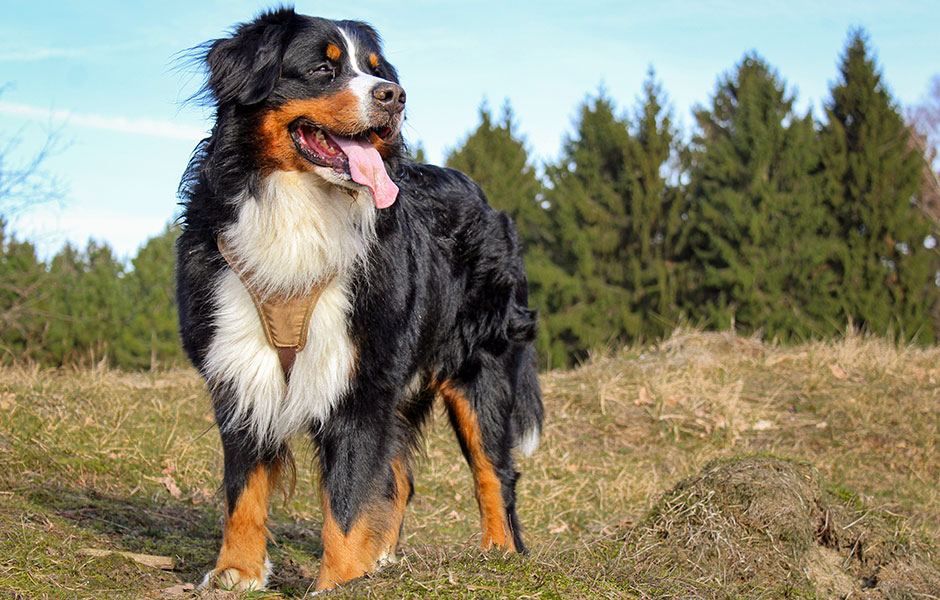
8. Best Service Dog for Apartment Living: Cavalier King Charles Spaniel
Cavaliers are great for service work in small spaces. For psychiatric support, they’re naturally tuned into human emotions and can sense anxiety or depression before it gets overwhelming.
These small dogs provide comfort during panic attacks, interrupt repetitive behaviors, or remind seniors to take psychiatric medications. They’re perfect for pressure therapy – lying across your lap during difficult moments.
Their size makes them ideal for seniors in apartments or assisted living facilities. They won’t accidentally trip you in tight hallways, and other residents find them friendly instead of intimidating.
About the Author: The writing team at Service Dog Certifications is made up of folks who really know their stuff when it comes to disability laws and assistance animals. Many of our writers and editors have service dogs themselves and share insights from their own experiences. All of us have a passion for disability rights and animals.
Related Articles

Do Border Collies Make Good Service Dogs?
When choosing a service dog, whether it be for physical or psychiatric disability, it has to be “need over breed.” Let’s face it, you may love the Chihuahua breed, but when it comes to aiding you with specific tasks, this little guy may not be up for the job. Do Border Collies make good service […]

Read More

Can a Yorkie Be a Service Dog?
The Yorkshire Terrier is a big dog in a small package. With his silky coat and traditional “topknot,” the Yorkie is sure to attract attention wherever he goes. And because of his pint-size, this dog often travels in style – in designer doggy purses or special totes made just for those “elite” pooches. The Yorkie […]

Read More

Can a Maltese Be a Service Dog?
Who can resist the snow white coat, dancing eyes, and spunky nature of the Maltese? This cute, spritely little pooch excels at many things like agility, tracking, obedience, and rally. Can a Maltese be a Service Dog? If so, you would be able to go anywhere you go with your Maltese! Read on as we […]

Read More
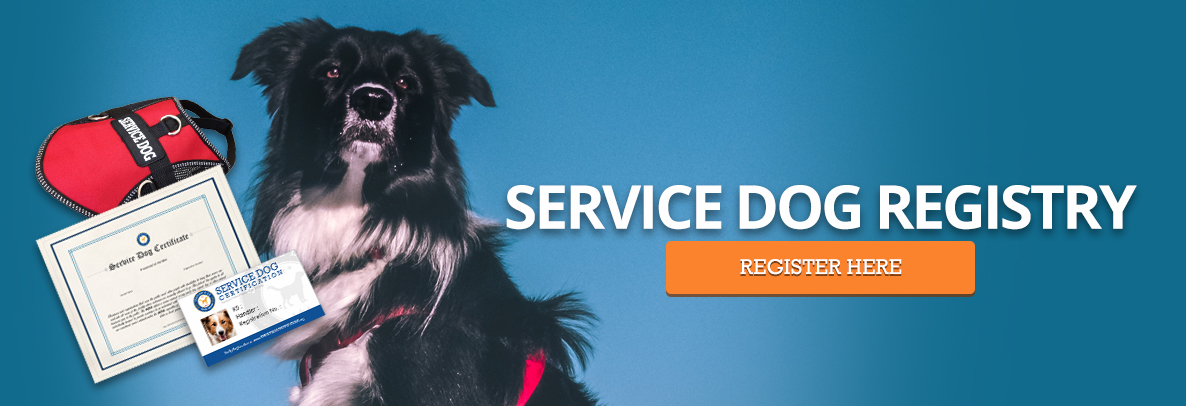
Hello,
My sd passed in February 2020. Though she was very small she was mighty in 💗. She was my migraine alert dog and also alerted my husband differently by licking him. We discovered she was letting him know when his blood levels were off. Grace a female maltese can be seen on Facebook to educate those who don’t think a small cute dog can have a significant purpose in life or help those over 50 w medical issues. I’m having great trouble though trying to afford another. I had only heard last year that as a licensed assistance dog I could have received between $2000-$3000 a year to assist me with her care but I don’t know the name of the organization. She passed all her public access tests and the shelter in California gave me her tag which said assistance dog on it w her permanent I’d # she had all her life. I carry it with me always. Please. Anyone who can help me afford a new puppy to train with love, kindness, respect for her in the most nurturing was possible-could you please contact me as soon as you can? My pain has once again increased and my husband misses the living relationship we had for her. Now in Nevada is seems the prices have skyrocketed dramatically. People want a cute puppy they can shove into their purse but what about those on a strict fixed income? One must raise an sd as young as possible and shelters often have so many abused animals. I know. We adopted a dog who had epilepsy in the 80s. She was a wonderful medium sized dog and we loved her for 12 years+ plus but we had an active family then. My husband and I were in our early 30s. Then I developed painful migraines after 1992. I prayed for there to be a way to stop them. While looking for a sheltie one day a pet store was out. As I was leaving my gut instincts said that’s the one. I turned around and saw the tiniest puppy I’d ever seen. I saw the price and I fled but a week later i was back with half the money it took me an entire year to save. They called the owner who said bbn i had enough. An hour later I was holding her and I didn’t have a clue why only that I trusted my instincts. I taught her not to bark before she was one because that’s a migraine trigger. Before age 2 she began gesturing in a new way and by the 3rd day I knew Grace knew before my pain came when I could do something about it to stop it from coming. A friend in a sd group invited me in. Though I didn’t have the issues the group had they gave me valuable information and encouraged me to get her licensed due to her size. It was 2007 then and I suppose the laws are much less lax as I see dirty old dogs in shopping carts at the store! But Grace was bathed once a week. Groomed every 2 months. I never dragged her anywhere. She came w me to my doctor’s appointments and he was amazed at my marked improvement. In my family we’ve always said thank you to all our dogs and bedtime was no exception. Now and then I’d wake to feel her laying on my chest. This is how she alerted me in my sleep. It was her way of saying, “Mom your pain is coming. ” I’d take my rx. Hug her and say Thank you Grace. Mommy loves you and you’re a very good girl. I also kissed her and she’d lay back near my toes and go to sleep. By Grace doing this o never once woke up with a migraine hangover. These things can last for weeks and weeks. I simply don’t know what to do. While she did all this by her nature and easy going way I know I cam train a dog to do things too. It’s simply that I don’t have 4grand to plop down. I only paid $900 for her and in 2005 this is a lode of cash for a 13 week old ten ounce puppy. We moved here because California became too expensive for us to stay. Food is still expensive but we all have medical costs to pay and the health insurance here pails to what we got in So Calif. I miss it. I might be able to drive back to Orange county alone if I found another puppy. My husband now disabled more than I wouldn’t be able to travel though. Or Arizona? Idk.🤷♀️
I’ve dealt with Chronic Fatigue Syndrome since I was only a 13 year old little girl. Pregnancy caused me to develop Fibromyalgia around age 37. I was in bed for 16 years as my children grew up without me. They’re now all grown. No one diagnosed me. I studied diseases for a year and found only one sight that mentioned it and my dog Grace was by my side. My migraine dr concurred w my findings but said there was nothing which could be done but with the love of Grace I triumphed and got out of bed in 2013!! My husband had always been supportive and the glow in his face said it all. Since Grace passed he can no longer walk and his health has declined. Doctors here are still running tests on both of us. With degenerative disc disease in my lower back and 3 crushed discs pushed up in the back of my neck making it bend I find myself in the roll of caregiver in our ever slowing lives and a new dog wou look d bring us so much joy. I’ve heard of toy shelties at Fox Point Farms in Nevada but it’s 8 hours away and that means staying in a hotel over night but I don’t think he could endure the trip. They’re more active though. While we’ve both had shelties in our lives we were active kids then too. A smaller maltese puppy is simply what I know has worked for us both in our late 60s. He’s 69. This is not a made up story by anyone. It’s my story and I own it. I have Dream Catchers by Cherokee West on fb and every cent I make goes towards saving for another maltese medical dog for us. While many of you may be skeptical that’s your right. We both owe our lives to Grace. We only ask for the chance to bring another dog similar in size into our home to help us medically and spiritually as well. She was a pleasure to love and care for. It’s rare for these dogs to be in service. Yet there are several accounts from people praising the maltese for their dedication to their owners. Were just a couple of old folks trying to get by like everyone else. Thanks
Thanks for the information on Service Dogs. My husband and I are retired Registered Nurses. I am Disabled with Giant Cell Arteritis and have Mobility Impairment. I am looking at Collies for a possible Mobility Dog. I also have severe Anxiety due to the illness and not being able to ambulate well and have fallen several times. We have a rescue Corgie Dauchson Jack Russell beagle mix and a pure breed long haired Chiahuahua that while throwing my husbands rachetballs and our Corgie mix fetching them has made my hand coordination go from not eating with utensils to independent now and brushing our long haired Chiahuahua and holding him more independent with upper body coordination. I am now progressing to working on ambulating and am searching for a collie for mobility purposes. I have had both outpatient and home rehab with occupational and physical therapy for over two years as well. I am in hope of certification of our small dogs and a new collie for service dogs. Thanks for your information as is much helpful!
Best Regards,
Kelli Dawn Hornsby
We think you’ll find this article covering some basics regarding service dog requirements helpful: https://www.servicedogcertifications.org/service-dog-requirements/
We’re so happy to hear about how your dogs help you and wish you the best in your journey.
I wish I could afford a service dog To help with mobility issues.
Adopting a fully trained service dog can certainly be very expensive. One alternative route you could explore is self-training a service dog, or training a service dog with the assistance of a paid professional trainer. Those methods are also allowed under ADA rules.